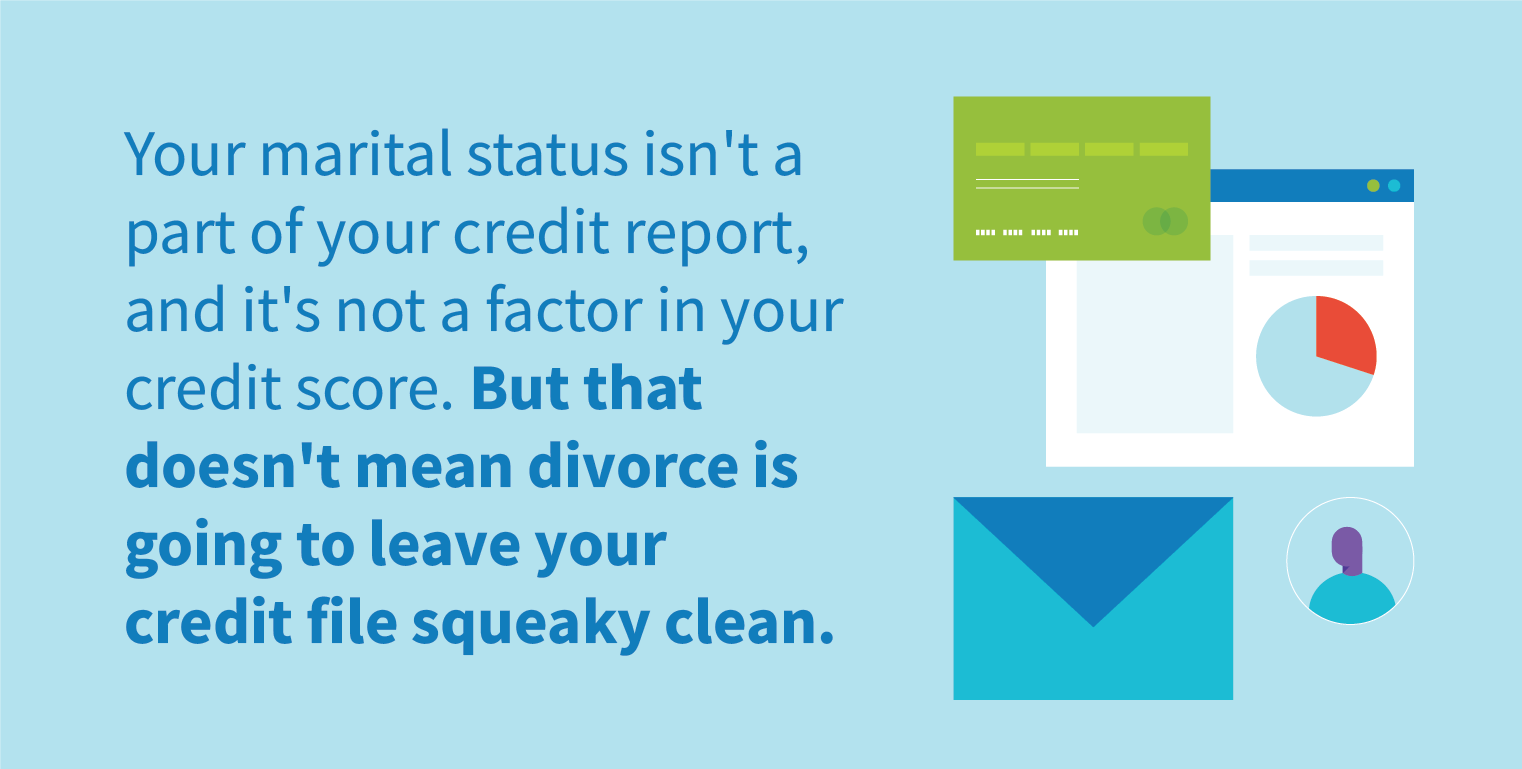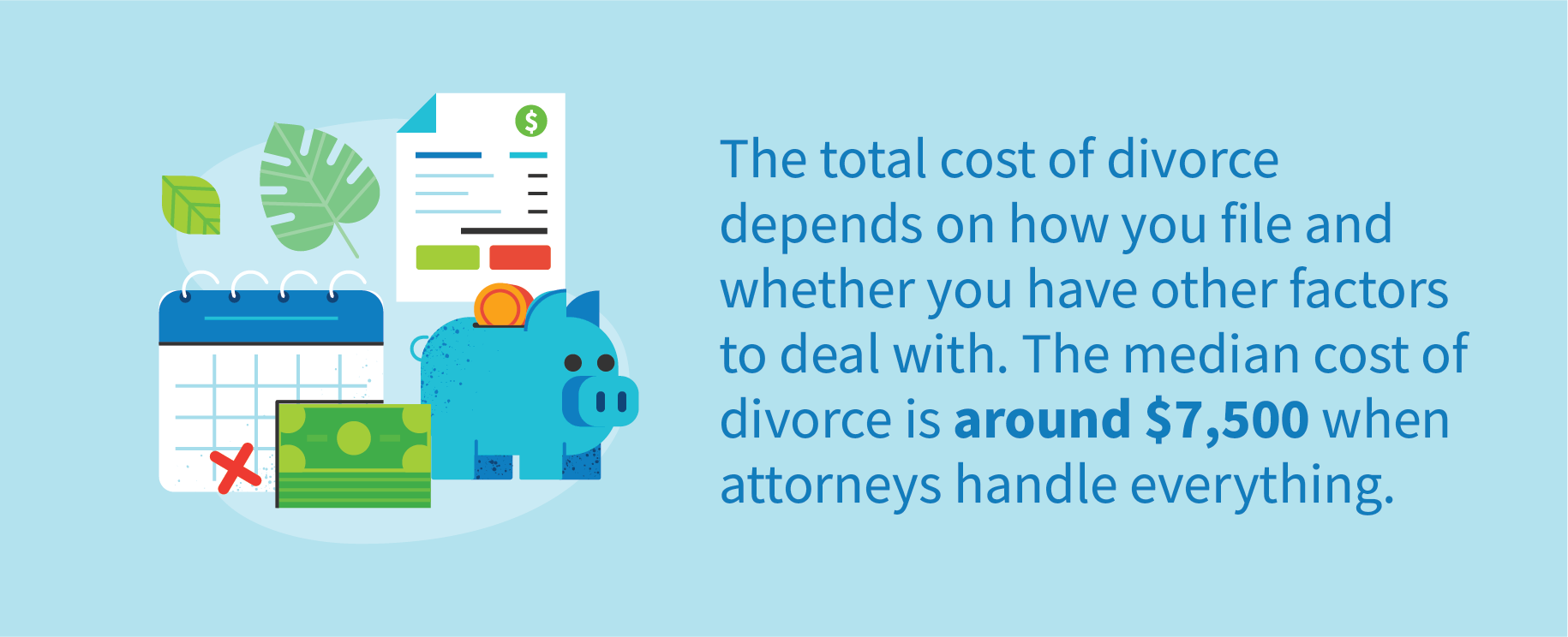
Money and marriage are tied tightly together, so it’s no surprise to many that money and divorce (unfortunately) go together too. In fact, studies show that disagreement over money is one of the strongest predictors of future divorce. And during and after divorce, it’s normal for people to experience financial distress. Understanding your options for credit repair after divorce and knowing how to protect yourself financially can help you shore up your future as a newly single person.
How Does Divorce Affect Credit?

It’s critical to understand how divorce affects credit. Many people hear stories about divorce wrecking someone’s credit. But it’s not the divorce that causes the problem—it’s the financial actions and decisions surrounding the divorce.
Your marital status isn’t part of your credit report, and it’s not a factor in your credit score. According to Experian, the credit bureau, changing your marital status in any way doesn’t, by itself, impact your credit.
But that doesn’t mean divorce is going to leave your credit file squeaky clean. Here are some common reasons people experience credit hiccups following a divorce.
1. Sudden Changes in Income
According to the National Bureau of Economic Research, family income can decrease by 40 to 45 percent for people who divorce and remain unmarried for at least the next six years. Even if you don’t take that big a hit in a divorce, you’re converting from two people sharing income and expense responsibilities to one person handling their own.
That can make it more difficult to keep up with payments, leading to increased risk for late payments or even defaults on loans. Those negative items drag down your credit score. And, in worst-case scenarios, they can live on your credit history for seven years.
In extreme cases, post-divorce income can fall so short of expenses that someone decides to file for bankruptcy. While bankruptcy does come with a so-called financial clean slate, it also brings your credit score down. Make sure you consider all your options and weigh the pros and cons of bankruptcy carefully before you decide it’s a pre- or post-divorce option for you.
2. Your Ex Doesn’t Keep Up Their Part of a Bargain
It’s common, though not necessarily always the best idea, for married couples to lean on each other when it comes to credit. If one of you has good credit, it may be enough to get approved for a mortgage, for example. But relying on your spouse to carry the good credit name in a marriage can leave you without a credit history if you get divorced.
Even more risky is relying on your ex to help keep your credit score safe after divorce. Many people are surprised to find, upon divorce, that their partner had previously hid financial facts from them. Around 45 percent had some type of financial skeleton in the closet, such as high amounts of debt, secret spending or a hidden bank account.
If you can’t rely on a spouse to have your best interests in mind when it comes to money, do you want to rely on an ex to do so? If you split up the debts and just agree to each pay your part, that’s what you’re doing.
Consider, for example, a situation where you own a car together. Both your names are on the loan, but your spouse takes the car and agrees to make the payments. If they don’t, your credit also gets dinged with the late payment.
3. Changes to Your Credit Profile
One option is to change the way your debts are structured. Your spouse could take out a new loan for the car in their own name, paying off the old one. You could close joint credit card accounts after paying them off. One of you might buy the other out of a mortgage by getting approved for an all-new loan in your own name.
This helps reduce your reliance on each other for continued good credit, but it could have some temporary impact on your credit score. It’s important to understand these potential effects before you take financial action.
- Changed credit age. The overall and average age of your credit plays a role in your score. If you take out new loans to refinance older debts you had with a spouse, you can reduce the age of your credit.
- Increased credit utilization. Credit utilization is how much of your available credit you’re using. If you have a credit card with a $10,000 credit limit and your balance is $5,000, your credit utilization is 50%. Credit utilization makes up around 30% of your credit score, and studies indicate that it’s best to keep it below 10% whenever possible.
- Changed credit mix. Managing different types of credit responsibly can help improve your score and looks good to lenders. If you split your debts after divorce and end up with only credit cards or one auto loan, the less diverse credit mix could lower your score some.
Understanding these factors lets you make educated decisions about your personal finances. It also helps you understand where to take action to potentially build your credit after divorce.
Preparing Financially for Divorce
It sounds dire, but with the right planning, you can mitigate or avoid some of these issues. Educating yourself about credit, your own finances and the money part of your marriage is a great first step. Check out these other tips for protecting yourself or recovering financially after divorce.
How Much Does a Divorce Cost?
The total cost of divorce depends on how you file and whether you have other factors, such as child custody, to deal with. In most cases, if you can agree on everything going into the divorce, it’s less costly. According to Nolo, the median cost of divorce is around $7,500 when attorneys handle everything.
If you’re headed toward divorce and know it, it’s a good idea to save as much money as you can. If you know as a couple you’re getting divorced and can cooperate in this endeavor, it can help you both after divorce. You’re less likely to run up more credit card debt in divorce paying for legal proceedings, for example.

Joint Bank Accounts and Divorce
Have a plan for joint bank accounts. It may be a good idea to open your own bank account as soon as you separate and start putting your own income there. You can’t necessarily empty your joint bank account of funds, especially if that money is considered marital or community property. Instead, try to work together to create a plan for splitting the money.
In cases where that’s not possible, talk to your attorney about including bank account balances in the divorce paperwork. Ultimately, your goal should typically be to get the money out and split in a legal manner and then close the account. Otherwise, your name is still on the account, making you liable for any activity or potential fees in the future.
Filing Taxes After Divorce
Divorce can definitely make tax time more complicated, especially the first year or two after the fact. If your divorce isn’t finalized, you have the option to file a joint return or file separately. Each has different benefits when it comes to potential refunds, so you should consider talking to a tax professional before you decide.
Once you get past that decision, make sure you and your ex have an understanding about how you will include dependents and related expenses on your returns. Taxes are often overlooked during the divorce and can cause a fight later. After all, claiming dependents can mean a bigger refund, so consider including these agreements in your divorce paperwork to avoid problems in the future.
Credit Repair After Divorce
Even if you plan ahead to protect yourself financially during and after divorce, splitting up rarely leads to perfect circumstances immediately. Be prepared to protect your credit as best as you can, to avoid taking a hit.
But that doesn’t mean you need to take the hit lying down. And it definitely doesn’t mean that you need to accept unfair or incorrect damage to your credit score.
Divorce can be complex, and it’s easy to make small mistakes during the process. It’s also easy for the small mistakes of others to cause a problem on your credit report. From items that aren’t yours to late payments that weren’t actually late, little errors can add up to a poor credit score.
Ensuring your credit report is fair and accurate might be the last thing on your mind during and after a divorce. And chances are, you don’t have a lot of extra time and energy to spend right now. If you find yourself in a difficult situation, you can get help from the experienced services of CreditRepair.com. CreditRepair.com works with you and on your behalf to check your credit and challenge errors to help you work for the credit score you deserve.






